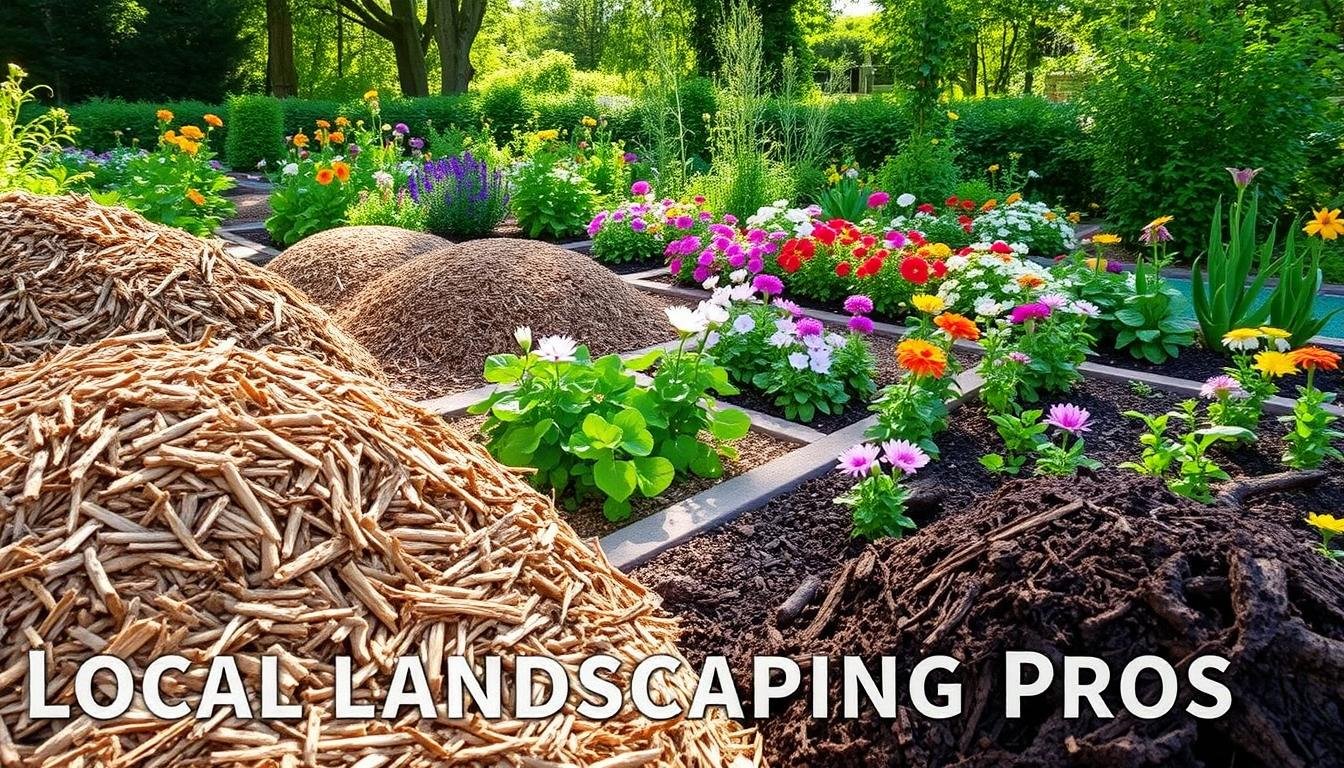
Did you know organic mulch can cut down soil water loss by up to 70%? This fact shows one of the many perks of using organic mulch in your garden. As we explore sustainable landscaping, you’ll see how this simple method can change your outdoor areas.
Organic mulch is a big deal in gardening today. It’s not just for looks; it boosts soil health, saves water, and helps plants grow strong. By picking organic mulch, you’re going green with your gardening.
Local Landscaping Pros – Murrieta leads in organic mulching. They can show you how to get the most out of this landscaping gem. As we look at organic mulch’s benefits, you’ll see why it’s key for a green, beautiful yard.
Key Takeaways
- Organic mulch significantly reduces water evaporation from soil
- It improves soil health and promotes stronger plant growth
- Using organic mulch aligns with sustainable landscaping practices
- It offers both aesthetic and functional benefits to your garden
- Local experts can guide you in maximizing organic mulch benefits
What Is Organic Mulch?
Organic mulch is key in organic gardening. It’s a natural layer on soil that helps plants grow and soil health. There are many types of mulch, all made from plants, each with its own benefits.
Definition and Types of Organic Mulch
Organic mulch is made from materials that can break down and improve soil. You can use bark, wood chips, straw, and leaves. These materials make the soil better and help with composting.
Common Materials Used
Bark mulch, from pine or cedar, lasts long and looks good. Wood chips, from tree trimming, keep soil moist. Leaf mold, made from leaves, makes soil better and helps microorganisms.
| Mulch Type | Decomposition Rate | Best Use |
|---|---|---|
| Bark | Slow | Ornamental beds |
| Wood Chips | Medium | Pathways, trees |
| Leaf Mold | Fast | Vegetable gardens |
Straw and hay are great for vegetable gardens. Grass clippings give a quick nutrient boost. Cocoa hulls smell nice but be careful around pets. The right organic mulch makes your garden healthier and more beautiful, supporting green gardening.
Key Benefits of Using Organic Mulch
Organic mulch is great for your garden. It makes the soil better, keeps it moist, controls weeds, and helps plants stay healthy. Let’s dive into these benefits.
Moisture Retention in Soil
Organic mulch keeps the soil moist. It covers the soil, stopping water from evaporating. This keeps the soil wet longer, helping plants grow well, even when it’s hot and dry.
Weed Control and Prevention
Organic mulch also fights weeds. It blocks sunlight, stopping weed seeds from growing. This means you spend less time pulling weeds, giving you more time for other garden tasks.
Temperature Regulation
Mulch helps control soil temperature. It keeps the soil cool in summer and warm in winter. This stable temperature is good for roots and soil life, making the soil better and plants healthier.
| Benefit | Impact on Landscape |
|---|---|
| Moisture Retention | Reduces watering frequency, promotes healthy growth |
| Weed Control | Minimizes weed growth, saves time on garden maintenance |
| Temperature Regulation | Protects roots, enhances soil microbial activity |
Adding organic mulch to your garden makes it better. It needs less care and supports strong plant health. The benefits of keeping soil moist, controlling weeds, and regulating temperature make mulch essential for gardeners.
How to Apply Organic Mulch in Your Landscape
Using organic mulch is a big part of sustainable landscaping and organic gardening. It makes the soil healthier and helps plants grow better. Let’s go through the steps together.
Step-by-Step Guide on Application
1. Clear the area: Take out weeds and debris around your plants.
2. Water the soil: Make the ground damp before adding mulch.
3. Create a barrier: Keep a small space between mulch and plant stems to stop rot.
Recommended Depth and Coverage
The right depth for organic mulch depends on the plant and the weather:
- For flower beds: 2-3 inches deep
- Around trees and shrubs: 3-4 inches deep
- Vegetable gardens: 1-2 inches deep
Don’t pile mulch against tree trunks or plant stems. This can hurt the plants. For top-notch mulch application and tree services, call Local Landscaping Pros – Murrieta at 951-309-9107. They’ll make sure your landscape gets the best care with organic mulch.
Frequently Asked Questions (FAQs)
Let’s look at some common questions about organic mulch in landscaping. Our experts at Local Landscaping Pros – Murrieta have answers. They help you use organic mulch benefits in your garden.
What is the Best Type of Organic Mulch for My Garden?
The right organic mulch for your garden depends on your needs. Bark chips last long and add color. Compost feeds your plants. Straw is good for vegetable gardens.
Choose based on your soil, plants, and the look you want.
How Often Should I Replace Organic Mulch?
Organic mulch breaks down, adding nutrients to the soil. This is part of its benefits. Most gardens need new mulch every year.
Apply a 2-3 inch layer in spring. Add more in fall if needed. Thicker mulches might last longer.
Can I Use Organic Mulch Around Trees?
Yes, organic mulch is great for trees. It keeps moisture in and controls soil temperature. Spread 3-4 inches around the tree, but not too close to the trunk.
This helps your trees and makes your landscape look better. Our team at Local Landscaping Pros – Murrieta knows how to mulch around trees.






No comment yet, add your voice below!